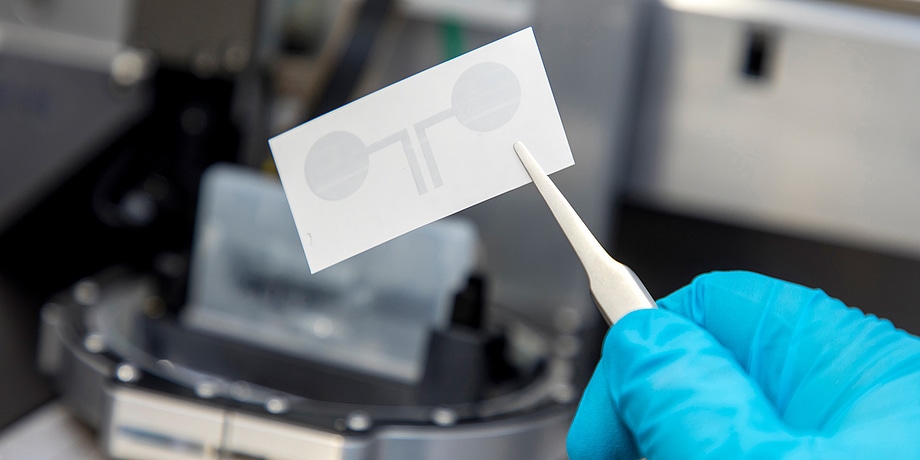Mar 30 2018
Gel electrodes are usually preferred for transmitting electric impulses from the muscle or heart in diagnostic techniques such as electromyography (EMG) and electrocardiogram (ECG). During clinical usage, the often cumbersome and stiff electrodes evidently restrict the mobility of patients and lead to discomfort of the patients.
 Researchers at TU Graz present tattoo electrodes from the printer, which are particularly attractive for long-term medical diagnostics. (Image credit: Lunghammer—TU Graz)
Researchers at TU Graz present tattoo electrodes from the printer, which are particularly attractive for long-term medical diagnostics. (Image credit: Lunghammer—TU Graz)
Since the gel on the electrodes gets dried out after a relatively short period of time, the probabilities of taking measurements over a long period of time with this kind of electrodes are very less. Francesco Greco from the Institute of Solid State Physics at TU Graz collaborated with scientists from Scuola Superiore Sant’ Anna in Pisa, Università degli Studi in Milan, and Instituto Italiano di Tecnologia (IIT) Pontedera to report an innovative technique in the journal Advanced Science, which increases the transmission of electrical impulses from humans to machine to a higher level by using printed tattoo electrodes.
Printed Tattoo Electrodes for Long-Term Diagnostics
In the prevalent technique, conducting polymers are printed on temporary, commercial tattoo paper, thereby developing single or multiple electrode arrangements. The external connections needed for transmitting the signals are directly integrated into the tattoo. Then, the tattoo electrodes are applied to the skin similar to temporary transfer pictures and can barely be felt by the user.
Since they are extremely thin, less than 1 mm, the electrodes can be thoroughly adapted to the uneven human skin, and can even be attached to body parts to which conventional electrodes cannot be attached easily, for example, the face.
With this method, we have managed to take a big step forward in further developing epidermal electronics. We are on a direct road to making an extremely economical and simple as well as versatile applicable system which has enormous market potential.
Francesco Greco, Materials Scientist - Institute of Solid State Physics of TU Graz
Greco reported that international biomedical companies have already exhibited substantial interest in the shared development of marketable products.
Personalizing Epidermal Electronics
Another attribute of the printer-created tattoo electrodes is that their conductivity and signal transmission are not impaired by even a perforation of the tattoo, for instance, through the growth of a hair. This specifically holds good for long-term applications since hair growth causes inaccuracies in the results when conventional measuring techniques are adopted.
In the investigations performed by the Italian Austrian research team, flawless transmissions of up to three days were trialed. According to Greco, this enables the measurement of electrophysiological signals of athletes and patients over a longer period of time without influencing or restricting their normal activities. The printer can be used to produce electrodes of different arrangements and sizes, and the electrodes can be individually adapted to the respective body part on which the measurement is to be performed.
We are working on the development of wireless tattoo electrodes with integrated transistor which would make it possible to both send and receive signals. Not only could we measure impulses using this method, but we could also stimulate body regions in a targeted way.
Francesco Greco, Materials Scientist - Institute of Solid State Physics of TU Graz
Francesco Greco from TU Graz’s Institute of Solid State Physics is performing research on this topic in collaboration with the group of Paolo Cavallari, professor of human physiology at Università degli Studi in Milan, and Professor Christian Cipriani, head of the Biorobotics Institute of Scuola Superiore Sant’ Anna in Pisa, and also with his former research team at Instituto Italiano di Tecnologia (IIT) Pontedera.